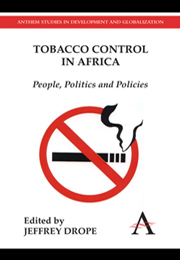Book contents
- Frontmatter
- Contents
- List of Figures and Tables
- Foreword
- Preface
- Acknowledgments
- List of Abbreviations and Acronyms
- 1 Introduction
- 2 The Political Mapping Process
- 3 Progress on Smoke-Free Policies
- 4 Taxation as a Tobacco Control Strategy
- 5 The Challenges of Implementing Bans on Advertising, Promotion and Sponsorship
- 6 The Pursuit of Packaging and Labeling Requirements
- 7 Burkina Faso
- 8 Cameroon
- 9 Eritrea
- 10 Ghana
- 11 Kenya
- 12 Malawi
- 13 Mauritius
- 14 Nigeria
- 15 Senegal
- 16 South Africa
- 17 Tanzania
- 18 Zambia
- 19 Conclusion: Tobacco Control in Africa – People, Politics and Policies
- Notes on Contributors
- Index
18 - Zambia
Published online by Cambridge University Press: 05 March 2012
- Frontmatter
- Contents
- List of Figures and Tables
- Foreword
- Preface
- Acknowledgments
- List of Abbreviations and Acronyms
- 1 Introduction
- 2 The Political Mapping Process
- 3 Progress on Smoke-Free Policies
- 4 Taxation as a Tobacco Control Strategy
- 5 The Challenges of Implementing Bans on Advertising, Promotion and Sponsorship
- 6 The Pursuit of Packaging and Labeling Requirements
- 7 Burkina Faso
- 8 Cameroon
- 9 Eritrea
- 10 Ghana
- 11 Kenya
- 12 Malawi
- 13 Mauritius
- 14 Nigeria
- 15 Senegal
- 16 South Africa
- 17 Tanzania
- 18 Zambia
- 19 Conclusion: Tobacco Control in Africa – People, Politics and Policies
- Notes on Contributors
- Index
Summary
Executive Summary
Despite Zambia's sizeable tobacco cultivation and its signifi cant resource constraints (it is rated 165 of 177 countries on the Human Development Index), it is emerging as a tobacco control story with promise. It has signed and ratifi ed the Framework Convention on Tobacco Control (FCTC), and has existing, though decidedly problematic, laws and apparent will in several key sectors to take on new tobacco control challenges. Prevalence rates have been poorly measured for adults, but appear to be high relative to other Sub- Saharan African countries. By some accounts, 40 percent of male adults are smokers (though probably not daily smokers) while less than 10 percent of women are smokers. Youth smoking is lower at around 10 percent for daily smokers. Zambia also has a growing problem with noncigarette tobacco use.
By nearly all accounts, most of the existing legislation is vague and weak, and requires redevelopment. There is a movement in the advocacy community to seek these changes in the form of new legislation. This task, however, will require major efforts on the part of the advocacy community to educate (and seek to infl uence) policymakers using solid research. With a new government, there may be a genuine window of opportunity to pursue this avenue in the short term and many high-level policymakers have indicated overt support for tobacco control including the president, the vice president, the minister of agriculture and the mayor of Lusaka (the capital city).
- Type
- Chapter
- Information
- Tobacco Control in AfricaPeople, Politics and Policies, pp. 261 - 282Publisher: Anthem PressPrint publication year: 2011



